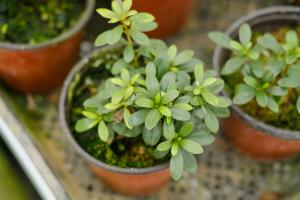Can You Fertilize Tomatoes After Planting?
Tomatoes are a popular and beloved vegetable that can be consumed in many forms – from salads to sauces to soups. In order to grow healthy, robust tomatoes that yield a bountiful harvest, fertilization is key. But what happens if you forgot to fertilize your tomato plants at the time of planting? Can you still fertilize them later on? The answer is yes, you can fertilize tomatoes after planting.
When is the Best Time to Fertilize Tomatoes?
The best time to fertilize tomatoes is at the time of planting. But if you missed this opportunity, you can still fertilize your tomatoes later on. The ideal time to fertilize tomatoes is during the growing season, about once every two to three weeks. This ensures that they receive a steady supply of nutrients that will aid in their growth and development.
What Type of Fertilizer Should You Use?
When it comes to fertilizing tomato plants, there are many options available. The type of fertilizer you choose will depend on your specific needs and preferences. Organic fertilizers such as compost or manure are excellent choices for those who prefer to use natural methods. They are also environmentally friendly and can improve soil quality over time. Chemical fertilizers are also available, but caution must be taken when using them as they can be harmful to the environment if not used correctly.
How to Fertilize Tomatoes After Planting?
When fertilizing tomatoes after planting, it is important to apply the fertilizer correctly to ensure that it is absorbed properly. Begin by watering the soil around the tomato plant thoroughly. This allows the roots to absorb the water and nutrients more easily. Next, apply the fertilizer according to the instructions on the packaging. Be sure not to over-fertilize, as this can damage the plant. Once the fertilizer has been applied, water the plant again to help distribute the nutrients throughout the soil.
When Should You Stop Fertilizing Tomatoes?
While it is important to fertilize tomatoes during the growing season, it is equally important to know when to stop. In general, it is a good idea to stop fertilizing tomatoes about four to six weeks before the first expected frost date. This allows the plant to focus on maturing its fruit rather than using energy to grow new foliage. Over-fertilization can also cause excessive vegetative growth, leading to larger plants with fewer fruits.
The Importance of Fertilizing Tomatoes
Fertilizing tomatoes is crucial to their growth and development. Without proper nutrients, tomato plants can develop a number of issues such as blossom end rot, stunted growth, or poor fruit production. By fertilizing tomatoes regularly, you can ensure that they receive the vital nutrients they need to thrive. In addition to producing a bountiful harvest of delicious tomatoes, fertilizing your plants can also improve soil quality and promote healthy microbial activity in the soil.
Conclusion
While it is ideal to fertilize tomatoes at the time of planting, it is still possible to fertilize them throughout the growing season. Choosing the right type of fertilizer and applying it correctly can make all the difference in the health and production of your tomato plants. Remember to stop fertilizing a few weeks before the first expected frost date and to not over-fertilize, as this can cause more harm than good. With proper care and attention, your tomato plants will thrive and reward you with a bountiful harvest.

 how many times do yo...
how many times do yo... how many planted tre...
how many planted tre... how many pine trees ...
how many pine trees ... how many pecan trees...
how many pecan trees... how many plants comp...
how many plants comp... how many plants can ...
how many plants can ... how many plants and ...
how many plants and ... how many pepper plan...
how many pepper plan...































